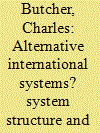| Srl | Item |
| 1 |
ID:
142540


|
|
|
|
|
| Summary/Abstract |
Were precolonial state systems different to the European model? If so, how did these state systems vary, and do variations in system structure influence the frequency of war? In this article we assess the structure off international systems in nineteenth-century West Africa, Southeast Asia, and South Asia using new data on precolonial states that corrects for some of the biases in the existing Correlates of War state system membership data. We develop a framework to capture variation in political order above and below the state, and explore the similarities and differences between these systems and the European system we know and study. We then assess how rates of inter- and intra-state war varied across these systems. Our results suggest: (1) It is the nature of hierarchy (not so much anarchy) that varies across these systems; and (2) inter-state wars are more frequent, but less intense, in systems composed of decentralised states.
|
|
|
|
|
|
|
|
|
|
|
|
|
|
|
|
| 2 |
ID:
113333


|
|
|
|
|
| Publication |
2012.
|
| Summary/Abstract |
This paper presents "strategic hedging" as a way to conceptualize much of the strategic behavior currently employed by second-tier states like China, Russia, Brazil, and France. Hedging is an alternative to strategies like balancing, bandwagoning, and buck-passing. Like those other strategies, hedging is driven by structural incentives associated with the current polarity of the international system and power concentration trends within it. Hedging will be most prevalent in international systems that are defined by a leading state that, while in a position of power preponderance, is also in the process of relative decline. Strategic hedging behavior is effective for second-tier states in such deconcentrating unipolar systems because it avoids outright confrontation with the system leader in the short term, while still increasing the hedging state's ability to survive such a direct military confrontation should it occur in the long run. Strategic hedging behavior can also be used to insure the hedging state against security threats that might result from the loss of public goods or subsidies that are currently being provided by the system leader. In this article, I define strategic hedging behavior, present a mechanism for identifying empirical evidence of strategic hedging, and apply that mechanism to three case studies: the Sino-Russian strategic partnership, Brazil's approach to regional leadership, and French opposition to the 2003 us invasion of Iraq.
|
|
|
|
|
|
|
|
|
|
|
|
|
|
|
|